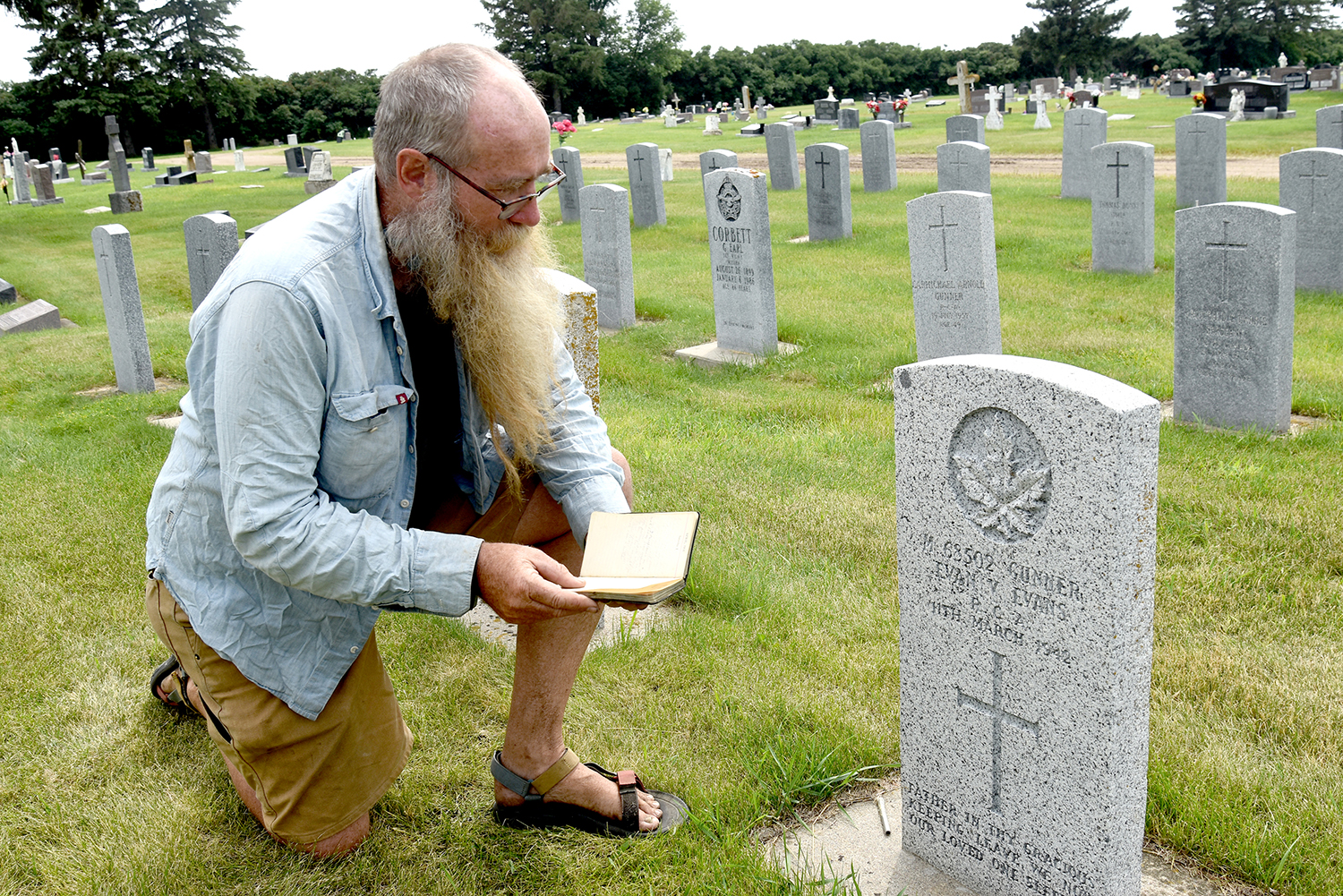Current Temperature
Australian cyclist commemorates war graves around the world
Posted on July 13, 2023 by admin Westwind Weekly News Photo By Meg Noguchi
JOURNEY: Mic Whitty, a 58-year-old Australian who’s been trying to visit every cemetery where a Commonwealth First or Second World War casualty is buried, visited Taber Memorial Gardens on Monday as he cycles his way across the country toward Newfoundland.
Westwind Weekly News Photo By Meg Noguchi
JOURNEY: Mic Whitty, a 58-year-old Australian who’s been trying to visit every cemetery where a Commonwealth First or Second World War casualty is buried, visited Taber Memorial Gardens on Monday as he cycles his way across the country toward Newfoundland.By Al Beeber
Southern Alberta Newspapers
Australian Michael ‘Mic’ Whitty is on a mission that has him crossing Canada to visit every cemetery where a First or Second World War casualty is buried.
Travelling the country on a single-speed bicycle from Vancouver, Whitty stopped in Taber on Monday as he headed east with his goal being to reach Grassy Lake and then Medicine Hat on Tuesday.
Whitty is on a six-month visa and he will be visiting as many of those cemeteries that he comes across close to the highway.
The 58-year-old long-time resident of the United Kingdom is on his eighth year of visiting the cemeteries. His goal is to visit all 25,630 Commonwealth war grave locations around the world.
He was inspired after rediscovering a diary written by his grandfather about his experiences on the Western Front in 1916, Whitty’s initial plan being to retrace his grandfather’s experiences through France and Belgium. His travels have since taken him to Gallipoli, Turkey which holds a special place in the hearts of Australians where about 50,000 served during the infamous First World War campaign.
He is documenting his journey on a Facebook page called Je Suis Catweazle where he is posting photographs of gravesites along with information about the person buried at them.
In Lethbridge he visited St. Patrick’s cemetery and noted on one post “by the number of painted stones at the base of the headstones of Leasing Aircraftman Thomas Carroll, RAAF, & Sergeant Alexander Clarke, Royal Canadian Artillery, it would seem they are visited often.”
After a stop in Fort Macleod, Whitty posted “in addition to the eleven casual-ties of both world wars that lie in the Union Cemetery, Fort Macleod, Alberta is the grave of Brigadier Frederick Maurice Watson Harvey, VC, MC, who died in 1980 aged 91.”
He also pointed out the grave of a member of the Royal Australian Air Force named Corporal William Joseph Crotty who is buried in the Holy Cross Cemetery just outside Fort Macleod. Crotty died on April 22 1943 at the age of 24.
In Claresholm, he came across the graves of six members of the RAAF who he presumed were killed as a result of flying accidents during training. They are among 11 Second World War casual-ties buried in Claresholm.
In High River, he stopped at the graves of six Canadian and British servicemen buried in the Highwood Cemetery.
In a telephone interview from the side of Highway 3 Monday, Whitty said the weather was perfect for his travels.
Whitty was working in England for about 10 or 15 years and then ended up homeless by his own doing. In reorganizing his life, he rediscovered the 1916 diary that his grandfather wrote as an Australian in the First World War.
“That coincidentally was in late 2015 so recognizing that the centenary year was just a few months away, I said I could do something with this.”
Whitty decided to retrace the best he could his grandfather’s diary through France and Belgium.
A few weeks later when working out details where he needed to go, Whitty discovered his grandfather went to Egypt, so he substituted three months of 1916 with Gallipoli in Turkey instead rather than go to that country.
A friend gave him an old mountain bike and he rode from England to Turkey through Germany and Serbia in winter.
While in Gallipoli, “which is a particularly poignant place for Australians and New Zealanders, I made a point of cycling or visiting each of the 33 Commonwealth war grave cemeteries that are on the peninsula. So by the time I got back to France and Belgium, I had the idea that visiting all the cemeteries on the Western Front – about 415 from Belgium down to Switzerland, I realized by then if I’m going to follow the diary,” he would be in one village for months at a time. So he used the cemetery like picking off mountain peaks and that gave the trip structure.
A one-year trip ensued in 2016 and then he started to think about what he would do when he was finished because he felt he would just go back to homelessness. So Whitty turned the trip into a three-year journey. And he made a goal to visit all First World War cemeteries in France, Belgium, Netherlands and Germany, a total of about 2,000.
While technically he is still homeless, Whitty “is on a mission” and decided to keep going and he wants to hit all 2,000 cemeteries in Canada where First or Second World War Commonwealth soldiers are buried.
His long-term goal is continue until Victory in Japan Day in 2045. So Whitty still has 22 more years to go.
He is now using an old French Peugeot single speed bicycle which has lasted him 41,000 kilometres with bad brakes. He has to walk up every hill that’s more than a two per cent gradient which means he’s had to do a lot of pushing since leaving Vancouver and he hopes it’s still with him when he finishes the trip.
Leave a Reply
You must be logged in to post a comment.

